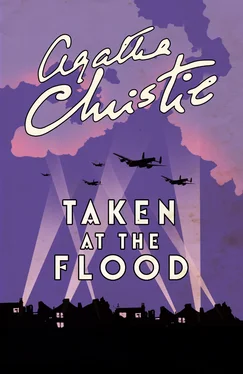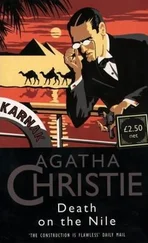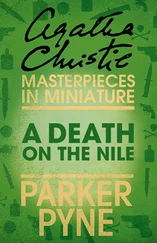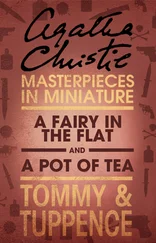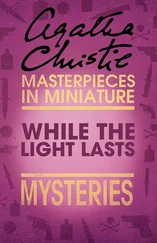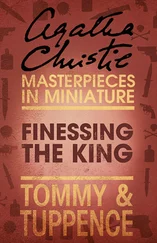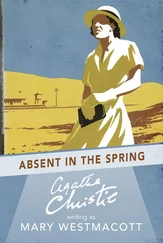‘Well, I didn’t think any more of it, but six months later I heard that Underhay had died of fever up in the bush somewhere. His natives were a trustworthy lot and they came back with a good circumstantial tale and a few last words scrawled in Underhay’s writing saying they’d done all they could for him, and he was afraid he was pegging out, and praising up his headman. That man was devoted to him and so were all the others. Whatever he told them to swear to, they would swear to. So there it is… Maybe Underhay’s buried up country in the midst of equatorial Africa but maybe he isn’t—and if he isn’t Mrs Gordon Cloade may get a shock one day. And serve her right, I say. I never met her, but I know the sound of a little gold-digger! She broke up poor old Underhay all right. It’s an interesting story.’
Major Porter looked round rather wistfully for confirmation of this assertion. He met two bored and fishy stares, the half-averted gaze of young Mr Mellon and the polite attention of M. Hercule Poirot.
Then the newspaper rustled and a grey-haired man with a singularly impassive face rose quietly from his arm-chair by the fire and went out.
Major Porter’s jaw dropped, and young Mr Mellon gave a faint whistle.
‘Now you’ve done it!’ he remarked. ‘Know who that was?’
‘God bless my soul,’ said Major Porter in some agitation. ‘Of course. I don’t know him intimately but we are acquainted… Jeremy Cloade, isn’t it, Gordon Cloade’s brother? Upon my word, how extremely unfortunate! If I’d had any idea—’
‘He’s a solicitor,’ said young Mr Mellon. ‘Bet he sues you for slander or defamation of character or something.’
For young Mr Mellon enjoyed creating alarm and despondency in such places as it was not forbidden by the Defence of the Realm Act.
Major Porter continued to repeat in an agitated manner:
‘Most unfortunate. Most unfortunate!’
‘It will be all over Warmsley Heath by this evening,’ said Mr Mellon. ‘That’s where all the Cloades hang out. They’ll sit up late discussing what action to take.’
But at that moment the All Clear sounded, and young Mr Mellon stopped being malicious, and tenderly piloted his friend Hercule Poirot out into the street.
‘Terrible atmosphere, these clubs,’ he said. ‘The most crashing collection of old bores. Porter’s easily the worst, though. His description of the Indian rope trick takes three quarters of an hour, and he knows everybody whose mother ever passed through Poona!’
This was in the autumn of 1944. It was in late spring, 1946, that Hercule Poirot received a visit.
Hercule Poirot was sitting at his neat writing-desk on a pleasant May morning when his manservant George approached him and murmured deferentially:
‘There is a lady, sir, asking to see you.’
‘What kind of a lady?’ Poirot asked cautiously.
He always enjoyed the meticulous accuracy of George’s descriptions.
‘She would be aged between forty and fifty, I should say, sir. Untidy and somewhat artistic in appearance. Good walking-shoes, brogues. A tweed coat and skirt—but a lace blouse. Some questionable Egyptian beads and a blue chiffon scarf.’
Poirot shuddered slightly.
‘I do not think,’ he said, ‘that I wish to see her.’
‘Shall I tell her, sir, that you are indisposed?’
Poirot looked at him thoughtfully.
‘You have already, I gather, told her that I am engaged on important business and cannot be disturbed?’
George coughed again.
‘She said, sir, that she had come up from the country specially, and did not mind how long she waited.’
Poirot sighed.
‘One should never struggle against the inevitable,’ he said. ‘If a middle-aged lady wearing sham Egyptian beads has made up her mind to see the famous Hercule Poirot, and has come up from the country to do so, nothing will deflect her. She will sit there in the hall till she gets her way. Show her in, George.’
George retreated, returning presently to announce formally:
‘Mrs Cloade.’
The figure in the worn tweeds and the floating scarf came in with a beaming face. She advanced to Poirot with an outstretched hand, all her bead necklaces swinging and clinking.
‘M. Poirot,’ she said, ‘I have come to you under spirit guidance.’
Poirot blinked slightly.
‘Indeed, Madame. Perhaps you will take a seat and tell me—’
He got no further.
‘Both ways, M. Poirot. With the automatic writing and with the ouija board. It was the night before last. Madame Elvary (a wonderful woman she is) and I were using the board. We got the same initials repeatedly. H.P. H.P. H.P. Of course I did not get the true significance at once. It takes, you know, a little time . One cannot, on this earthly plane, see clearly. I racked my brains thinking of someone with those initials. I knew it must connect up with the last séance—really a most poignant one, but it was some time before I got it. And then I bought a copy of Picture Post (Spirit guidance again, you see, because usually I buy the New Statesman ) and there you were—a picture of you, and described, and on account of what you had done. It is wonderful, don’t you think, M. Poirot, how everything has a purpose ? Clearly, you are the person appointed by the Guides to elucidate this matter.’
Poirot surveyed her thoughtfully. Strangely enough the thing that really caught his attention was that she had remarkably shrewd light-blue eyes. They gave point, as it were, to her rambling method of approach.
‘And what, Mrs—Cloade—is that right?’ He frowned. ‘I seem to have heard the name some time ago—’
She nodded vehemently.
‘My poor brother-in-law—Gordon. Immensely rich and often mentioned in the press. He was killed in the Blitz over a year ago—a great blow to all of us. My husband is his younger brother. He is a doctor. Dr Lionel Cloade… Of course,’ she added, lowering her voice, ‘he has no idea that I am consulting you. He would not approve. Doctors, I find, have a very materialistic outlook. The spiritual seems to be strangely hidden from them. They pin their faith on Science—but what I say is…what is Science—what can it do?’
There seemed, to Hercule Poirot, to be no answer to the question other than a meticulous and painstaking description embracing Pasteur, Lister, Humphry Davy’s safety lamp—the convenience of electricity in the home and several hundred other kindred items. But that, naturally, was not the answer Mrs Lionel Cloade wanted. In actual fact her question, like so many questions, was not really a question at all. It was a mere rhetorical gesture.
Hercule Poirot contented himself with inquiring in a practical manner:
‘In what way do you believe I can help you, Mrs Cloade?’
‘Do you believe in the reality of the spirit world, M. Poirot?’
‘I am a good Catholic,’ said Poirot cautiously.
Mrs Cloade waved aside the Catholic faith with a smile of pity.
‘Blind! The Church is blind—prejudiced, foolish—not welcoming the reality and beauty of the world that lies behind this one.’
‘At twelve o’clock,’ said Hercule Poirot, ‘I have an important appointment.’
It was a well-timed remark. Mrs Cloade leaned forward.
‘I must come to the point at once. Would it be possible for you, M. Poirot, to find a missing person?’
Poirot’s eyebrows rose.
‘It might be possible—yes,’ he replied cautiously. ‘But the police, my dear Mrs Cloade, could do so a great deal more easily than I could. They have all the necessary machinery.’
Mrs Cloade waved away the police as she had waved away the Catholic Church.
‘No, M. Poirot—it is to you I have been guided—by those beyond the veil. Now listen. My brother Gordon married some weeks before his death, a young widow—a Mrs Underhay. Her first husband (poor child, such a grief to her) was reported dead in Africa. A mysterious country—Africa.’
Читать дальше
